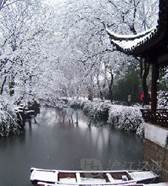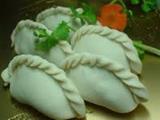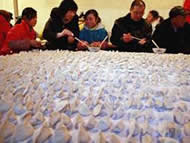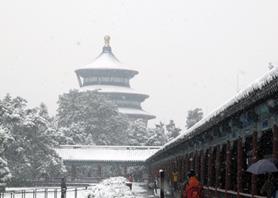News & Updates
Lotus - A trusted name in family travel
Winter Solstice / Winter Festival / Dongzhi
 Much of Asia marks the Winter Solstice with the traditional Dongzhi Festival in China, Japan, Korea, and Vietnam. Just like the spring festival, it doesn’t happen on a fixed day, but rather according to the shortest daytime and longest nighttime in the Northern Hemisphere. Accordingly, it varies among December 21st, 22nd or 23rd. As early as 2,500 years ago China had determined the point of Winter Solstice by observing movements of the sun with a sundial. After the date of Winter Solstice, days become longer and longer. The origins of this festival can be traced back to the yin and yang philosophy of balance and harmony in the cosmos. Traditional thought indicated that this symbolized the “yang” or muscular, positive things becoming stronger and stronger after this day, resulting in an increase of positive energy flowing in. The philosophical significance of this is symbolized by the character fù (復, "Returning"). Traditionally, the festival is a time for families to get together.
Much of Asia marks the Winter Solstice with the traditional Dongzhi Festival in China, Japan, Korea, and Vietnam. Just like the spring festival, it doesn’t happen on a fixed day, but rather according to the shortest daytime and longest nighttime in the Northern Hemisphere. Accordingly, it varies among December 21st, 22nd or 23rd. As early as 2,500 years ago China had determined the point of Winter Solstice by observing movements of the sun with a sundial. After the date of Winter Solstice, days become longer and longer. The origins of this festival can be traced back to the yin and yang philosophy of balance and harmony in the cosmos. Traditional thought indicated that this symbolized the “yang” or muscular, positive things becoming stronger and stronger after this day, resulting in an increase of positive energy flowing in. The philosophical significance of this is symbolized by the character fù (復, "Returning"). Traditionally, the festival is a time for families to get together.
 Origins and Foods
Origins and Foods
The festival’s origins trace back to the Han Dynasty where a renowned medical scientist Zhang Zhongjing found his fellow-townsman suffering when he returned from traveling. It was winter and he was appalled by the weak health of his fellow townsmen who had chilblains from skin being exposed to  cold temperatures and lack of good nutrition. Feeling sympathetic, he ordered his apprentices to make dumplings with lamb and other ingredients, and distribute them among the poor to keep them warm. Since the dumplings were shaped like ears, Zhang named the dish "qùhán jiāoěr tāng" (祛寒嬌耳湯) or dumpling soup that expels the cold. From that time on, it has been a tradition to eat dumplings on the day of Winter Solstice in northern China.
cold temperatures and lack of good nutrition. Feeling sympathetic, he ordered his apprentices to make dumplings with lamb and other ingredients, and distribute them among the poor to keep them warm. Since the dumplings were shaped like ears, Zhang named the dish "qùhán jiāoěr tāng" (祛寒嬌耳湯) or dumpling soup that expels the cold. From that time on, it has been a tradition to eat dumplings on the day of Winter Solstice in northern China.
 In southern parts of China, the tradition is to eat glutinous rice balls (also called tangyuan (湯圓). This is to symbolize reunion. Tangyuan are made of glutinous rice flour and sometimes brightly colored. Each family member receives at least one large tangyuan in addition to several small ones. The flour balls may be plain or stuffed. They are cooked in a sweet soup or savory broth.
In southern parts of China, the tradition is to eat glutinous rice balls (also called tangyuan (湯圓). This is to symbolize reunion. Tangyuan are made of glutinous rice flour and sometimes brightly colored. Each family member receives at least one large tangyuan in addition to several small ones. The flour balls may be plain or stuffed. They are cooked in a sweet soup or savory broth.
 The festival is celebrated as a time of taking care of one’s health as well as a time for gathering the family together for a reunion. Tonic foods are prepared according to traditional recipes to fortify the body. Nourishing the body with meat and fatty foods to fight the cold has become a way of observing the festival.
The festival is celebrated as a time of taking care of one’s health as well as a time for gathering the family together for a reunion. Tonic foods are prepared according to traditional recipes to fortify the body. Nourishing the body with meat and fatty foods to fight the cold has become a way of observing the festival.
Traditions
During the Tang and Song Dynasties (618 - 1279), emperors worshiped heaven and their ancestors on that day and prayed for a good harvest for their people. This winter festival was a time when all business and trade would come to a  halt as everyone, from high officials to border crossing guards would stop work and get together with family and friends to celebrate with gifts of festival foods and treats. All of the Chinese people at this time would pay homage to their ancestors. The Emperor would leave his palace and travel to the Temple of Heaven to pay respect to the tablet representing Heaven. This was no small feat and involved a parade of imperial princes, high officials and state functionaries as well as hundreds of performers, musicians, and servants bearing the imperial ancestral tablets and sacrificial objects. There was singing and dancing along the route as the festival was underway. The festival food also served as a reminder that celebrators are now a year older and should behave better in the coming year. Even today, many Chinese around the world, especially the elderly, still insist that one is "a year older" right after the Dongzhi celebration instead of waiting for the Lunar New Year. The Qing Dynasty (1644-1911) even had the record that "Winter Solstice is as formal as the Spring Festival," showing the great importance attached to this day.
halt as everyone, from high officials to border crossing guards would stop work and get together with family and friends to celebrate with gifts of festival foods and treats. All of the Chinese people at this time would pay homage to their ancestors. The Emperor would leave his palace and travel to the Temple of Heaven to pay respect to the tablet representing Heaven. This was no small feat and involved a parade of imperial princes, high officials and state functionaries as well as hundreds of performers, musicians, and servants bearing the imperial ancestral tablets and sacrificial objects. There was singing and dancing along the route as the festival was underway. The festival food also served as a reminder that celebrators are now a year older and should behave better in the coming year. Even today, many Chinese around the world, especially the elderly, still insist that one is "a year older" right after the Dongzhi celebration instead of waiting for the Lunar New Year. The Qing Dynasty (1644-1911) even had the record that "Winter Solstice is as formal as the Spring Festival," showing the great importance attached to this day.